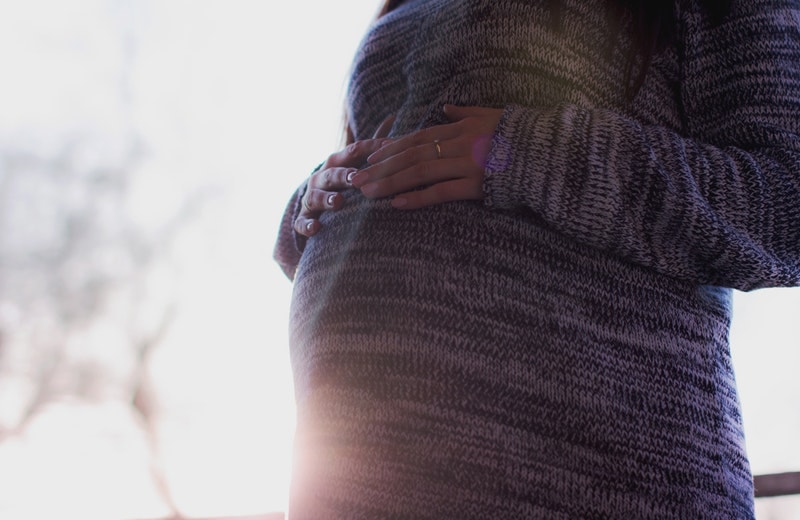The nine months of pregnancy can be full of strange and uncomfortable effects on a woman’s physical and emotional health. Morning sickness is a common pregnancy malady, but for some women, can be severe. Morning sickness is the name given to the feeling of nausea and vomiting some women experience. Despite its name, morning sickness can strike at any time during the day. Normally, this sickness only lasts the first trimester and gradually fades by the second trimester. Some women may experience a brief return of morning sickness late in their third trimester.
The exact cause of morning sickness is unknown. Researchers think it may occur because of changing hormone levels during pregnancy. Human chorionic gonadotropin, or HCG, levels go way up during early pregnancy and level off as the pregnancy progresses. This may cause issues of nausea and vomiting early on. Doctors believe that morning sickness can be a positive sign in early pregnancy because it means the pregnancy is progressing as it is supposed to. In fact, women who have no morning sickness have a greater risk of miscarriage.

Severe cases of persistent nausea and vomiting may require medications and hospitalizations. Although this sounds ominous, most cases involving these severe symptoms have a positive outcome with a healthy mother and baby at the end.
1. Persistent Vomiting
Persistent vomiting can be a sign of hyperemesis gravidarum. This condition caused excessive vomiting in pregnant women. While morning sickness typically starts to fade around the twelfth week of pregnancy, those suffering from hyperemesis may have persistent vomiting throughout all forty weeks of pregnancy. It can result in a decrease in urine output, weight loss while pregnant, and malnutrition. Sufferers sometimes need to stay in the hospital for periods of time during pregnancy in order to ensure proper nutrition, correct weight gain, and good hydration. The excessive vomiting that occurs with this condition can result in missed days of work, a decrease in social activities, and depression. Many sufferers describe this condition as feeling like they have a constant stomach bug. Eating smaller meals throughout the day may help ease the vomiting.
2. Severe Nausea
Severe nausea is a common sign of morning sickness. This can feel like constant motion sickness or like the stomach flu is coming on. There may or may not be vomiting present with nausea. Certain activities like brushing the teeth can trigger this nausea. Pregnant women have a keen sense of smell, and this sense can make them sensitive to certain odors, triggering nausea. Foods that were palatable before pregnancy may seem unappetizing and cause nausea. It seems paradoxical, but eating small snacks like crackers when nausea hits seems to help many women. Also, instead of eating three large meals a day, it may be easier on the stomach to eat smaller but more frequent meals.
3. Dehydration
Dehydration can become a problem for women who cannot keep food or drink down. Some signs of this include dark urine, dry mouth, excessive sleepiness, and decreased urine output. If the individual is not able to drink fluids due to persistent vomiting, it may be necessary to be hospitalized while intravenous fluids are administered.
4. Decrease in Urine
A decrease in urine can occur with severe morning sickness. A decreased urine output is a sure sign of dehydration. When an individual is unable to drink, or retain fluids due to excessive nausea and vomiting, dehydration occurs. Since the body is not getting enough fluids, it will not excrete the fluid that is present by urinating. It needs all the fluid it has access to if the body is not getting fluid from the outside. A decrease in urine may be a sign that intravenous fluids are needed in order to rehydrate the body.
5. Maternal Weight Loss
During a normal, healthy pregnancy, a woman should expect to gain weight throughout. Unfortunately, in pregnancies with severe morning sickness, some women are not able to eat or keep food down without vomiting. This can result in maternal weight loss. This is not healthy for the mother or the baby she is carrying as they both need good nutrition to thrive. If weight loss is persistent and other signs are present, medical attention may be necessary to support better nutrition for mother and baby.
6. Rapid Heartbeat
Lack of fluids in pregnant women can lead to a rapid heartbeat. This is a sure sign that a medical professional should be consulted. Excessive vomiting causes a decrease in fluids which in turn causes a rapid heartbeat. This is usually exhibited in patients with severe fluid issues. Hospitalization may be necessary to administer intravenous fluids and get mother and baby back on the right health track. A rapid heartbeat may also feel bounding as if the heart is working overtime. Dizziness due to lower than normal blood pressure can accompany this symptom.
7. Headaches
Headaches in pregnancy can be a sign of dehydration. This is particularly true in women who are experiencing severe episodes of vomiting. It is important to promote the intake of fluids during pregnancy especially if vomiting is present. If severe morning sickness is accompanied by a headache, rapid heartbeat, or decreased urine output, the mother should contact her healthcare professional about what should be done. Headaches can also be symptoms of hunger and low blood sugar levels due to vomiting.